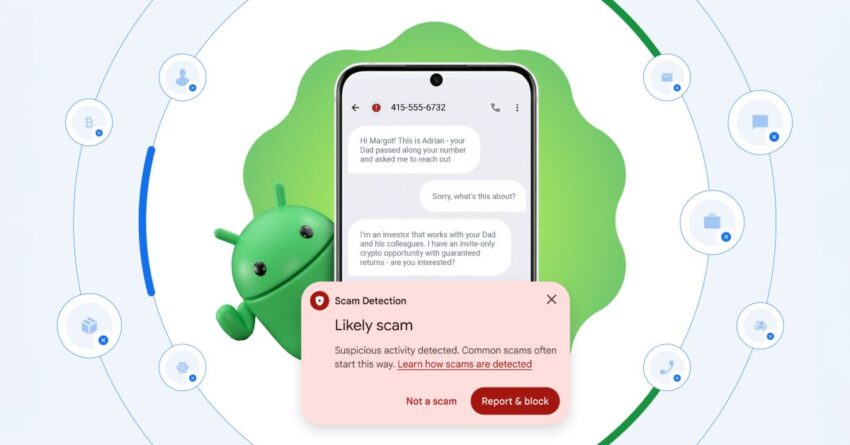
google study finds android avoids 58 more Google’s recent study reveals that Android devices are significantly more effective at avoiding spam and scam texts compared to their iOS counterparts.
google study finds android avoids 58 more
Introduction to the Study
In an effort to raise awareness about cybersecurity, Google collaborated with YouGov to conduct a comprehensive survey involving over 5,000 smartphone users across the United States, India, and Brazil. This initiative coincides with Cybersecurity Awareness Month, emphasizing the importance of digital safety in an increasingly connected world. The findings of this study shed light on the effectiveness of different mobile operating systems in filtering unwanted communications, particularly spam and scam texts.
Key Findings of the Survey
The survey’s results indicate a striking disparity between Android and iOS when it comes to managing spam and scam messages. According to the data, Android users are able to avoid 58% more spam and scam texts compared to those using iOS. This statistic raises important questions about the underlying mechanisms that contribute to this difference in performance.
Understanding Spam and Scam Texts
Spam texts are unsolicited messages often sent in bulk, typically for advertising purposes. Scam texts, on the other hand, are more malicious in nature, aiming to deceive users into providing personal information or financial details. Both types of messages pose significant risks to users, including identity theft and financial loss.
Methodology of the Study
The methodology employed in the study involved a detailed survey of smartphone users, focusing on their experiences with spam and scam texts. Participants were asked about the frequency of such messages, their operating systems, and the measures they take to protect themselves from these unwanted communications. The survey’s broad geographic reach, encompassing users from the US, India, and Brazil, provides a diverse perspective on the issue.
Implications of the Findings
The implications of these findings are significant for both consumers and technology companies. For consumers, the data suggests that choosing an Android device may offer enhanced protection against unwanted texts. This information could influence purchasing decisions, particularly for individuals concerned about cybersecurity.
Consumer Awareness and Behavior
As awareness of cybersecurity issues grows, consumers are becoming more discerning about the devices they choose. The findings from this study may encourage users to research the security features of different operating systems before making a purchase. Additionally, the survey highlights the importance of user education regarding spam and scam texts, as many individuals may not be aware of the risks associated with these messages.
Impact on Technology Companies
For technology companies, the study underscores the necessity of continually improving security measures. As spam and scam tactics evolve, so too must the defenses against them. The disparity in performance between Android and iOS may prompt Apple to enhance its spam filtering capabilities to compete more effectively in this area.
Stakeholder Reactions
The release of the study has elicited a range of reactions from stakeholders in the technology and cybersecurity sectors. Experts have praised Google’s initiative to raise awareness about cybersecurity, particularly in light of the increasing prevalence of spam and scam texts. Many believe that this study will serve as a catalyst for further research and development in mobile security.
Industry Experts Weigh In
Cybersecurity experts have noted that the findings align with existing knowledge about the differences in how Android and iOS handle security threats. Android’s open-source nature allows for a wider range of security applications and features, which may contribute to its superior performance in filtering unwanted messages. Conversely, iOS’s closed ecosystem may limit the options available for users seeking enhanced spam protection.
Consumer Advocacy Groups
Consumer advocacy groups have also expressed interest in the study’s findings. Many organizations are dedicated to educating the public about the risks associated with spam and scam communications. They emphasize the importance of being proactive in protecting personal information and suggest that users take advantage of the security features available on their devices.
Contextualizing the Findings
To fully understand the implications of the study, it is essential to consider the broader context of cybersecurity. The rise of digital communication has made it easier for scammers to reach potential victims, and the sophistication of these scams continues to evolve. As a result, both consumers and technology companies must remain vigilant in their efforts to combat these threats.
The Role of Technology in Cybersecurity
Technology plays a crucial role in enhancing cybersecurity measures. Advances in artificial intelligence and machine learning have enabled more effective spam filtering techniques, allowing devices to learn and adapt to new threats. As these technologies continue to develop, it is likely that the effectiveness of spam and scam text prevention will improve across all platforms.
Future Trends in Mobile Security
Looking ahead, it is clear that mobile security will remain a critical area of focus for both consumers and technology companies. As the number of smartphone users continues to grow, so too will the need for effective security measures. The findings of this study may serve as a benchmark for future research, prompting further exploration into the effectiveness of different operating systems in managing unwanted communications.
Conclusion
The Google and YouGov study provides valuable insights into the effectiveness of Android and iOS in avoiding spam and scam texts. With Android users experiencing a 58% reduction in such messages, the findings highlight the importance of choosing a device that prioritizes user security. As the landscape of cybersecurity continues to evolve, both consumers and technology companies must remain proactive in their efforts to combat spam and scams. The study serves as a reminder of the ongoing challenges in digital communication and the need for continued vigilance in protecting personal information.
Source: Original report
Was this helpful?
Last Modified: October 31, 2025 at 12:39 pm
3 views














